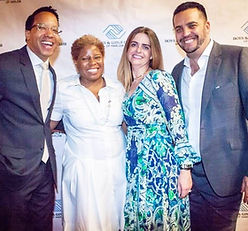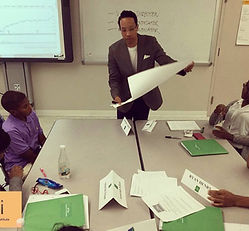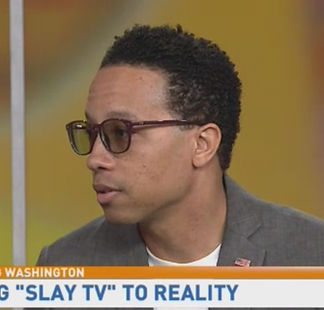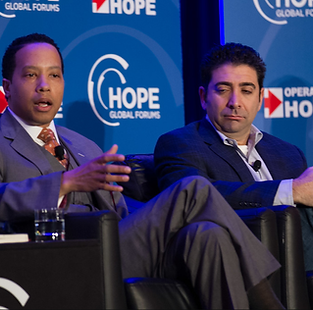



Growing up in Detroit in the middle of its economic demise, James was forever riddled by a place and time that seemed to be synonymous with the modern ruin of the industrial age. With the odds against him, his family was strong enough to insist on finding education through curiosity.
His sister is an award winning educator. She Co-Founded the Keith Institute, but she used to be annoying 😘 . His mom is a union steward at SEIU Local 517. His dad is a financial planner. They unknowingly taught James and his sister the value of a dollar by giving them an allowance for school grades with outdated check books. They had to write and balance checks for things they thought they'd like to buy with the allowances that they earned. James' parents were just looking for a way to stop the constant ask for things.
He says that he considered himself an entrepreneur, before he was familiar with the word. His mother tells a story of his suspension from school for selling Now And Later candy to his classmates in the 1st grade. The Detroit Public School's principal at McKinney Elementary told her that James would be a drug dealer. It turns out that he was only selling candy to make new friends to fight a bully from the orphanage next door. And so they did. JFK has been straddling the fence of entrepreneurship and politics for the 30 years since... And beating up bullies has become a sort of pastime.


In 2015 James married Andy Tarradath in New York City on the hills of the historic Marriage Equality ruling at the Supreme Court of the United States. After 30 years of struggling with identity, he became heavily involved in Bisexual and broader LGBTQ advocacy to add some of what he calls "economic activism" to the normal socio-political activism that is synonymous with organizing of disenfranchised groups. He is responsible for the Pride Nights at America's Big-Four sports leagues (Dec of 2014), established through his LGBT Chamber of Commerce. More recently in this line of activism he Co-Founded Slay., The Queer TV Network which empowered millions of people globally through TV, news & music content each day.
As one of his many grass-roots projects via the Keith Institute, James has been integral in building The Coalition of local leaders in New York City and the establishment of a Center in Harlem to prioritize Black and Latino citizens. They are the statistical majority of NY's & America's LGBTQ population but get minimal funding. At the national & international level he was an inaugural member of the Democratic National Committee's LGBT advisory board & lead the Black work group of World Pride 2021. JFK was the first Black LGBTQ person to run for US Congress or any American federal office in 2017.
Identity has been central to Keith's professional work. He is an award winning engineer and economist who specializes in the ethnography of technology. Plainly that means he studies how culture can be driven by technologies. Since the time he realized that he had little access to the power structures around him, he has been obsessed with how to scale economic inclusion and add more participants to modern capitalism.
As an engineer, James knows all too well the impacts of hyper automation on both product and service jobs in America. As an economist, he knows all too well that productivity is a measure of inputs, not toiling (work). As a corporate ethnographer, he knows all too well that the products and services that drive our economy are a result of the input that people contribute to the creation process. As a capitalist, he know that the best way to distribute the value from productivity is to give people legal ownership of their input. JFK knows that we've been fortunate to inherit a time where data is now, tangible evidence of our input.
While he thinks concepts like Socialism are lost in a previous century, he knows ownership of our contributions is the only way to install real social inclusion with income.


When JFK says "you are valuable", he means it is a fact that he can prove. This is especially important in an economy that has been unable to distribute value through jobs. As automation runs it's course, employers will want to pay less and less for jobs and processes that that they've enhanced. We still need what he calls Inclusionism.
This was the experience when he started his career in the year 2000 as a mechanical engineer-in-training. He was soon doing the work of engineers 30 years his senior for a fraction of the price, as a contractor, with no stake in the companies that he worked for, and no benefits. Fighting economic inclusion is personal. He says "Millennials my age and younger have been structurally casted out of the well paid workforce that our parents had access to". He has frequently stated that he had to become an entrepreneur to sell himself and companies to create jobs for his peers. He always considered entrepreneurship, activism, leading up to his founding of the Income Movement and Basic Income March.
He spent the second half of the 2000s trying to find a moral voice for capitalism. His day-job between Asia, Europe, and Southern Africa was an opportunity to examine many economic models. The division of middle class wage earners and working people across the globe was stark and he especially remembers the walls built between houses in Sandton, a suburb of Johannesburg. Being from Detroit and building a life in New York, he could make easy correlations between the class differences of Mzansi and home. It magnified his ambitions to solve what he saw as the real problem of modern economics; which was, how to distribute people's value to them.
After holding dual residency from 07-10, he returned home in 2010 to briefly join the faculty at the Land Policy Institute at Michigan State University and publish his first book Integrationalism which is the notion that
We are all connected at the subatomic level.
In that same year he opened an office to his first US consulting company in Time Square, NYC. His book did well at the Harlem Book Fair. In his initial efforts to establish an economics consulting firms, he witnessed the world changing around him. Before terms like Big Data and Data Scientists existed, he was consumed by New York because of the culture and the next software company he'd Co-Found: Accrue Inc., a predictive analytics software company for stocks futures and forex born out of the IBM Watson ecosystem.
By 2011 #Occupy and its many derivative movements were congregating on Manhattan under the Occupy Wall Street protests, and JFK was right there trying to do what engineers do by root-causing the people's frustrations.


He tends to think that all protests have an economic root. Engineers primarily spend their time on root-cause analysis and error-proofing, but it's much harder to analyze culture than tech. Still in order to more thoroughly understand the problems of NYC and America in general, he had to shift all of his focus to grass roots organizing. Simply, he needed to understand what everyone else thought they understood about both problems and solutions. During this time James started the Keith Institute to research what was wrong with the economy, and if there was a solution, how we'd distribute it. Keith Institute became and incubator for all of his entrepreneurship.
He started focusing on education programs, establishing safe spaces to increase the esteem of the most disenfranchised, and financial education. He regularly says it's "not the kind of education that helps balance a checkbook, but the kind of education that balances power". James is stuck on the notion that we are all connected and as a result, the notion that we all derive our value from each other. He thinks that the engineering fix to the problem of undervaluing the people that we are connected to, is to make "value" a unit of measurement. He know's it seems overly ambitious, but would "rather have a moral argument based on evidence, than stuff no one knows".
With that in mind all of the companies that he has created in Insurance, Finance, and Advertising, have been focused on data proliferation. He has been holding a single analogy in mind while working to sell companies over the past 7 years. The fact that:
Value is like that of energy. It cannot be created nor destroyed, but can change form.
That☝🏾, is the truth that most 8th graders are taught about the conservation-of-energy. Today everything has a data point, and we can start using economists to track where it goes, in the same way that we use engineers to track where energy goes. Keith's intention is not only to have a technological and economic conversation with the public, but to be able to use it as a backbone when having more meaningful conversations with people about their individuality, their community, their integrity, their safety, and their dignity.




In facilitating the paradigm shift that he often talks about with regards to people's value, he thinks that the change needs to be incentivized by policy. He considers policy a technology, just like any other methodological processes. Human's have never had access to digital copies of their personhood before, and while it seems like a no brainer that people should have agency over the information that disseminates from them, the reality is that they do not.
James' work is currently rooted in policy advocacy & activism. Through the establishment of The Data Union, a coalition of global data-rights orgs, he has been influential in passing laws across the globe that give people ownership of their data. This is already shifting labor and equity conversations about what monetary value people are entitled to. The difference in JFK's policies is that they help individuals and institutions start a negotiation on what is owed to whom from a standpoint of authority and ownership, instead of a standpoint of indignity and desperation. He is working with multiple state legislatures right now to pass his policies in the same fashion as those that he has influenced in Europe and Asia. This is most important because expanding everyone's ownership rights transforms all of the arguments that we've been losing for decades on: Affordability, Health Care, Education, Criminalization, Human Rights, Climate, Taxes... and so much more. This story is far from over, but just know that JFK is available to die to make the argument that you have an intrinsic value and should be indemnified for the engagement of that value. He thinks we owe it to ourselves. #WeOweUs

